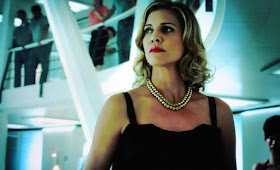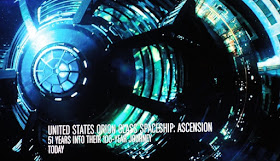"The time has come for mankind to take longer strides.
We must move further.... We must reach for the stars.
Imagine the greatest journey ever undertaken---a century long sojourn to a new world---completed by the grandchildren of the brave souls who embarked on this adventure.
Our eyes must be focused on the stars."
-Stock footage-


Best laid plans as they say.
The X-Files gave us an Ascension story in 1994, Stargate SG-1 provided a tale in 2001 along with the process by which the Ancients depart their physical vessels for a higher plane of existence.
Here, Ascension (2014) arrived by way of an under hyped SyFy television event mini-series.
Ascension, a six episode science fiction mystery mini-series clocking in at three hours, demonstrated aspirations to be the next SyFy event TV series a la Ronald D. Moore's Battlestar Galactica (2004-2009) but alas that was not to be. Battlestar Galactica (2004-2009) received its order following the Battlestar Galactica miniseries (2003) almost a year prior.

Ascension takes its high sci-fi concepts from a number of already well-established sources concerning the generation spaceship.
The series concept was inspired by an actual project under the John F. Kennedy administration (1961-1963) dubbed the Orion Project, here referred to as the top secret Ascension Project. Even the ship designed for Ascension echoes that of the ship designs for the Project Orion spacecraft to be propelled by nuclear propulsion for interplanetary or interstellar appropriations.

Ascension treads the journey thread a la the interstellar space travel of works like Interstellar (2014), Virtuality (2009) (here), Lost In Space (1965-1968) and others.
Ascension offers an alternate reality story of sorts as well. Instead of seeing a close to Project Orion as a result of the Partial Test Ban Treaty of 1963, a space mission is green lit. Six hundred volunteers board a massive self-supporting generation vessel fearing the Cold War could end in an eventual apocalypse.

The USS Ascension is tasked with a mission to colonize, not Alpha Centauri, but Proxima Centauri to ensure human survival.
Fifty-one years of seemingly smooth-sailing into the journey, and apparently nearing the point of no return, the ship's first homicide occurs with the murder of a young female. The perceived utopian-like reality begins to displays cracks.
What is most impressive, given a skeptical view of humanity, is that this mission has proceeded almost flawlessly without instance. That's stunning when you consider six hundred humans living in a contained environment.

So Ascension arrives inside of a long legacy of science fiction in television, film and literature in keeping with its specific story concept---the generation starship sub genre. There are many books of literature that explore the subject. As a reference see The Generation Starship In Science Fiction: A Critical History 1934-2001 by Simone Caroti. Books, television and film have all tapped into elements of this idea for years.
In film, Pandorum (2009), and in television, Star Trek: The Original Series episode For The World Is Hollow And I Have Touched The Sky (1968) come to mind exploring variations on these ideas.
Author Robert Heinlein's Orphans Of The Sky (1941) offers a story of a generation ship en route to Alpha Centauri. The story centers on passengers, without historical knowledge or basis, who simply don't realize they are living on a spaceship.

Frank Herbert's Destination Void (1965) pertains to a series of ships manned by clones sent on a one hundred year journey to a solar system without a sustaining planet. The clones must develop an artificial consciousness or perish.
Robert J. Sawyer's Golden Fleece (1990) likely bears the closest resemblance to Ascension whereby a death aboard a generation ship threatens its mission.
Ascension itself received relatively mixed reviews upon its arrival. Though it did land itself a tomato rather than a splat many critics offered praise as well as criticism in a single swoop. One writer noted a smart premise contrasted with a lack of character depth. Musings Of A Sci-Fi Fanatic explores its six entries combined for three nights aboard the Ascension for sci-fi fans of all generations.

One of the most alluring aspects of Ascension for me almost immediately, apart from the space-based nature of the mini-series itself, was the inclusion of actress Tricia Helfer. Former Playboy guest Helfer isn't a hard sell. Helfer, formerly Number Six on Ronald D. Moore's Battlestar Galactica, was a relative unknown and a revelation on that aforementioned series. Apart from her presence, utter sex appeal and sensuality she was delicious to watch as Cylon Number Six throughout the entirety of the series. Helfer, a previous question mark, truly fleshed out (pun intended) and brought to life her character. She was astonishing to watch even next to heavyweight contenders like Edward James Olmos and Mary McDonnell. Unlike the two aforementioned actors, Helfer was one of the last to be cast on Battlestar Galactica simply because executives were uncertain of her ability to carry the quantifiable demands of the role given her limited experience. In the end the risks were taken and the dice rolled and Helfer paid off in spades. It was a major victory for the series and doors deservedly opened to Helfer. So Helfer was the second major reason Ascension was a must analyze thus Musings Of A Sci-Fi Fanatic ascended upon the series.

Previously the Virtuality pilot was a real missed opportunity as a long-term series in this writer's view, I wondered too if Ascension shared a similar fate or exhibited similar potential for greatness?
Ascension surrounds a murder and unfolds over a framework of three nights originally aired as six chapters.

(SPOILERS AHEAD!) Ascension: Night 1 opens with a gorgeous, Hitchcockian money shot, aided by technology of course, whereby the camera ascends through the entirety of the space vessel, United States Orion Class Spaceship Ascension, ultimately taking us into space. This is an effective way of establishing location and placing us in the story visually. It is also a clever illusion. The sequence is expressed to the appropriately sweet sounds of Rocket Man by Elton John.
The Ascension is on a 100 year journey now at the 51 year marker. A murder has taken place on this day amidst a kind of lavish Mad Men-like weave of high drama combined with the existing class structure ("the lower deckers") of something like Titanic, but in space.

Each individual inevitably comes to terms with life aboard the ship. This coming-of-age period of one's life is termed the crisis. All aboard the Ascension are forced to realize there are limitations to their dreams. "Back on Earth you could dream as big as you wanted. Your parents could allow any illusions to die naturally. There were an infinity of possibilities to try."
"We don't have infinity. We only have the ship. We're born it. We die in it."

It is believed the deceased, Lorelei Wright, had an intense reaction to the crisis.
Evidence following an autopsy of death reveals a bullet, but no guns were allowed aboard the Ascension or noted in the ship's manifesto.
This is a subtle, issue oriented subtext. Gun control fanatics would have a field day. No one would clearly have committed a murder otherwise.
The commanding officer, Captain William Denninger notes the Ascension is nearing the point of no return regarding the option to return to Earth. Seriously though? After 51 years does it really matter at this point?

Brian Van Holt's (Black Hawk Down) character is married to Viondra, played by the delicious Helfer. Delicious ---in that she gets to sink her teeth into another manipulative, twisted, vicious ensemble role. And reminiscing of her earliest moments on Battlestar Galactica, one of her first moments to shine aboard the ship is fucking another man. Helfer presents a full skinjob shot and once again proves this Cylon was more than worthy of her appearance in Playboy---not that there's anything wrong with that.
Helfer's relationship with her husband is one of political-like brinksmanship and chess-playing as she assumes the role of politician and her husband the statesman. He is the hero of an event referred to as The Inferno. Viondra manages a service of beautiful women dubbed "the girls" to proxy information from the connected and powerful.

A good bit of energy and excitement kicks in for the final quarter of Night 1 as the ship approaches an ion radiation storm. The ship's crew runs into a number of challenges. Suspense mounts and the residents of Ascension must react swiftly.
The sequence is notable for presenting how the crew handles the radiation internally. It's a visually enticing sequence as the ship's lights flicker and a ghostly atmosphere seems to penetrate the vessel to the sweet voice of Lena Horne.
Director Stephen Williams frames a visually interesting first night. Williams is backed by some impressive credentials from his work on Lost (25 episodes) and the excellent Here's Not Here (2015) for The Walking Dead.

Ascension is replete with a number of interesting supporting characters too including actor Ryan Robbins. I've never understood why Robbins hasn't received a bigger role within the sci-fi genre. He's a wonderful actor who has had supporting parts (some small) in Millennium, Strange World, the Battlestar Galactica mini-series, Battlestar Galactica, Stargate Atlantis, Caprica, Falling Skies and Continuum. Honestly the man deserves better.
Production values are generally high throughout the series clearly establishing a period of re-branding to alter perceptions for SyFy. As a fan of science fiction it's a welcomed change.

My only grumble initially, as a fan of space exploration-based science fiction is that we never seem to see enough of the Ascension from the outside. There are a few, beautifully detailed close-ups of the vessel, but nothing holds on the ship or establishes a long shot of it soaring through space. We were spoiled and treated to lengthy shots of the Destiny gliding through space in Stargate Universe (2009-2011), or the Serenity in Firefly (2002), but nothing comes close here in the first installment of the mini-series. Even Virtuality offered a few more visuals than are noted here, but there is a perfectly logical explanation with a direct correlation to the story. The inhabitants of the Ascension are not actually in space. They are but a giant human, generational experiment.
Ascension actually enjoys all of the ingredients for a successful series, but Virtuality, more than Ascension, had the greatest potential and prospects for a long-term future. There is an awful lot to cover in just one night here on Ascension given the mini-series limitations of which Ascension seems a good candidate. As the first entry concludes with a nice twist in the story it is clear Ascension is very much in keeping with the science fiction works noted earlier.

"You think I don't have total control. Every detail from the movement of the stars to the flushing of the toilets is exactly as it would be on the real journey. The minute they doubt the validity of their environment is the minute the experiment fails. Ascension is a lifeboat for humanity."

Ascension delivers a first class fabrication and builds upon illusion and a lie. Ascension is a government classified version of The Truman Show (1998). The Truman Show worked with a tagline of On The Air. Unaware. The denizens of Ascension are allegedly In The Air. Unaware. Night 1 doesn't offer extraordinary science fiction, but it's a solid, more than competent effort within the sci-fi subgenre.
Writer: Phillip Levens/ Adrian A. Cruz.
Director: Stephen Williams (Lost, Person Of Interest).
Score: Trevor Morris.
Up Next: Ascension: Night 2.
Ascension Night 2 here.
Ascension Night 3 here.
























Thanks for the great writeup! I loved this series and will be checking out Golden Fleece, as sadly we didn't get to see the full story unfold on tv.
ReplyDeleteThanks so much A.
ReplyDeleteI'm assuming you are referring to Golden Fleece, a book by Robert J. Sawyer (Charlie Jade), but I'm not sure. I'm not familiar with Golden Fleece.